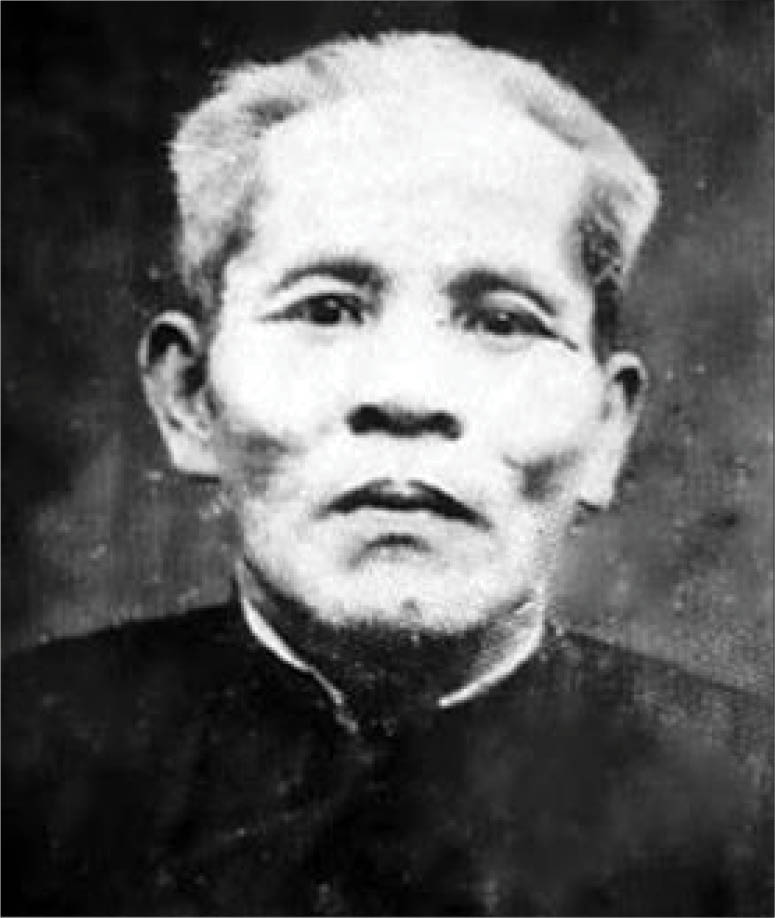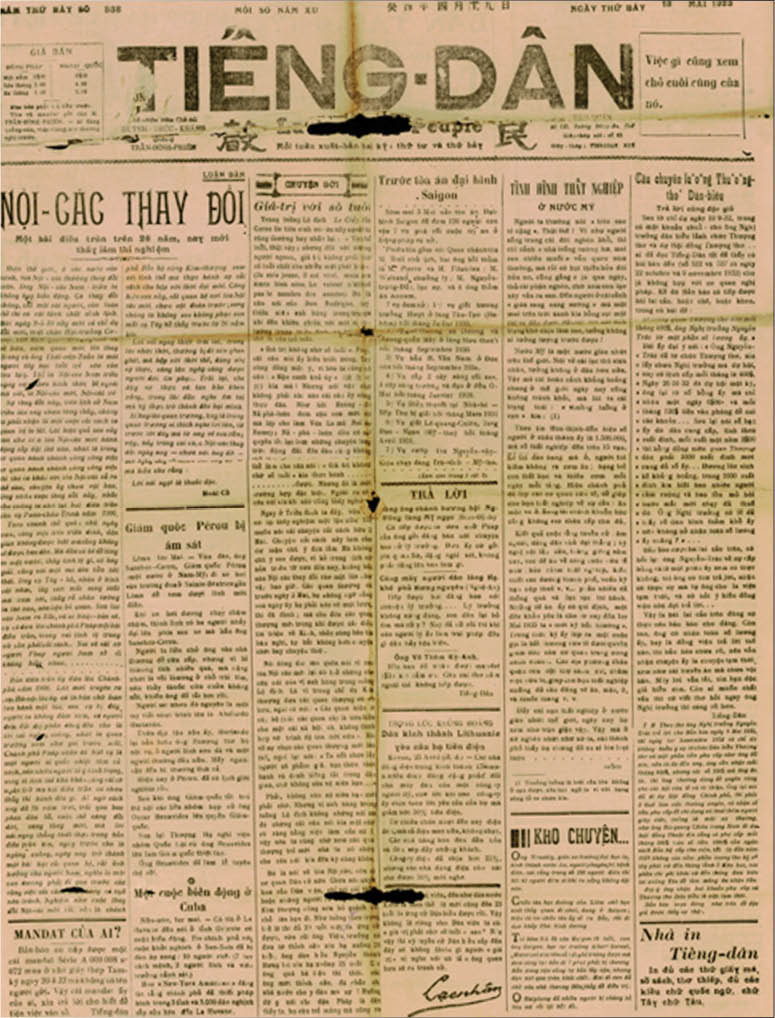
Portrait of Mr. Huynh Thuc Khang. Photo: TL
In the history of Vietnam media, Quang Nam people have been well known for their newspaper writing. That has been proved by Tieng Dan Newspaper by Mr. Huynh Thuc Khang and Song Huong (Perfume River) Magazine by Mr. Phan Khoi.
Besides the rich content expressing the spirit of Tieng Dan and Mr. Huynh, a member of the House of Representatives of the Central, the newspaper also touched upon many prominent and original cultural and social matters that arose in the East Meets West context and the transitional period between the old and the new.
Mr. Minh Vien-Huynh Thuc Khang (1876-1947) was born in Thanh Binh Commune, Tien Giang Thuong, Ha Dong District, Thang Binh (presently Tien Canh Commune, Tien Phuoc, Quang Nam Province.) As carved on the stele at the Temple of Literature in Hue, Mr. Huynh was born in Binh Ty (lunar) year. He went to study in the province in the 8th year of Emperor Thanh Thai’s reign (1896). He graduated in Canh Ty (1990, the 12th year of Emperor Thanh Thai’s reign). He became a PhD in Giap Thin (1904) when he was 29 together with his fellowman Tran Quy Cap (Bat Nhi Commune, Da Hoa Thuong, Dien Ban.)
The odd thing was that he did not want to become a mandarin. He stayed home instead, reading books and supported studying Vietnamese language. Because he took part in Duy Tan Movement, he was arrested and sentenced to death in 1908. But after that he got remission and was exiled to Con Dao.
Being set free in 1921, he continued his patriotic movement. In 1926, he was elected a member of the House of Representatives and head of the House in the Central. After the August Revolution, he was appointed the Minister of the Ministry of Domestic Affairs, and when President Ho went to France for the negotiation, he became Acting President.
Thanks to his role as a member of the House of Representatives, he continued his revolutionary fight for the country and people and formed Tieng Dan Newspaper (1927-1943) of many historical and cultural values in Hue and the Central region in early 20th century.
On October 8th, 1926, Mr. Huynh wrote to P. Pasquier, the French Governor-General to ask for permission to publish a newspaper in Vietnamese named Tieng Dan (La Voix du Peuple) with its headquarters in Da Nang to spread the patriotism and the renovation of the country in a non-violent way.
As planned, there were two issues/week (on Wednesday and Saturday,) with the aim of serving the nation, informing the authority of people’s wishes, supporting education of morality, knowledge, politics and economy. Not until December 12, 1927 did the Governor-General of Indochina sign the decree, allowing Tieng Dan Newspaper.

An issue of Tieng Dan Newspaper
The newspaper had a printing house of its own with Dao Duy Anh as an assistant, Tran Dinh Phien as a member of the managing committee, an accountant and a secretary. Besides, there was the participation of Tran Hoanh as the manager of the printing house and Nguyen Xuong Thai as a secretary; (he was also the secretary of the Tax Board in Da Nang.)
The owner of Tan Tan Cinema in Hue Tran Kieu Trinh and his nephew Pham Dang Nghiep (Pham Dang Tri’s father) assisted with accommodation and rented an office for it. Besides there was the assistance of Tran Dinh Nam and Prof. Vo Liem Son as editors and philanthropists.
It is noticeable that though agreeing, the French wanted the newspaper to have its headquarters in Hue. In April 1927, the newspaper officially stablished its headquarters at 123 Dong Ba St., (presently 193 Huynh Thuc Khang St., Hue). In the summer of 1927, Mr. Huynh Thuc Khang, Mr. Nguyen Xuong Thai and Mr. Dao Duy Anh went to Hanoi to buy the whole printing house Nghiem Han and brought it to Hue for Tieng Dan, intended to be started in autumn.
The French supervised the newspaper closely due to its aim at renovating the country for the people. In addition, Tieng Dan was also under the direct management and close supervision of Liem Phong Board (Media and Communication Board.)
In order to supervise Tieng Dan, L. Sogny, Director of Liem Phong Board formed a team including Bui Van Chung, Doan Nam (representative of the French in Bo Lai (Ministry of Domestic Affairs)) and Dang Thai Van (a member of Liem Phong Board). Tieng Dan was not allowed to do anything that might hurt the political relation between France and Vietnam.
According to the supervising procedure, the editorial department had to submit the first two issues to Liem Phong Board and a version in French. After being checked, an issue was returned with signatures and seal “visa pour publication,” meaning “allowed to be published.” After being published, two issues of the newspaper must be submitted for storage at the two archives of the French Resident Superior and the police.
From the first issue dated August 10, 1927 to the last issue before it was forced to close down on April 24, 1943 (No. 1766), Tieng Dan had contributed a lot to the history and culture of Hue in the Central and to the Vietnam media. It was because of this reason that the government decided to end it.
Born in Quang Nam and passed away in Quang Ngai, Mr. Huynh Thuc Khang’s career throve in and attached to Hue. His name was written in the Temple of Literature in Hue. The headquarters of Tieng Dan Newspaper will be conserved as a cultural and tourist address in relation with the media and document heritage in Hue and the Central region.
By TRAN DINH HANG
